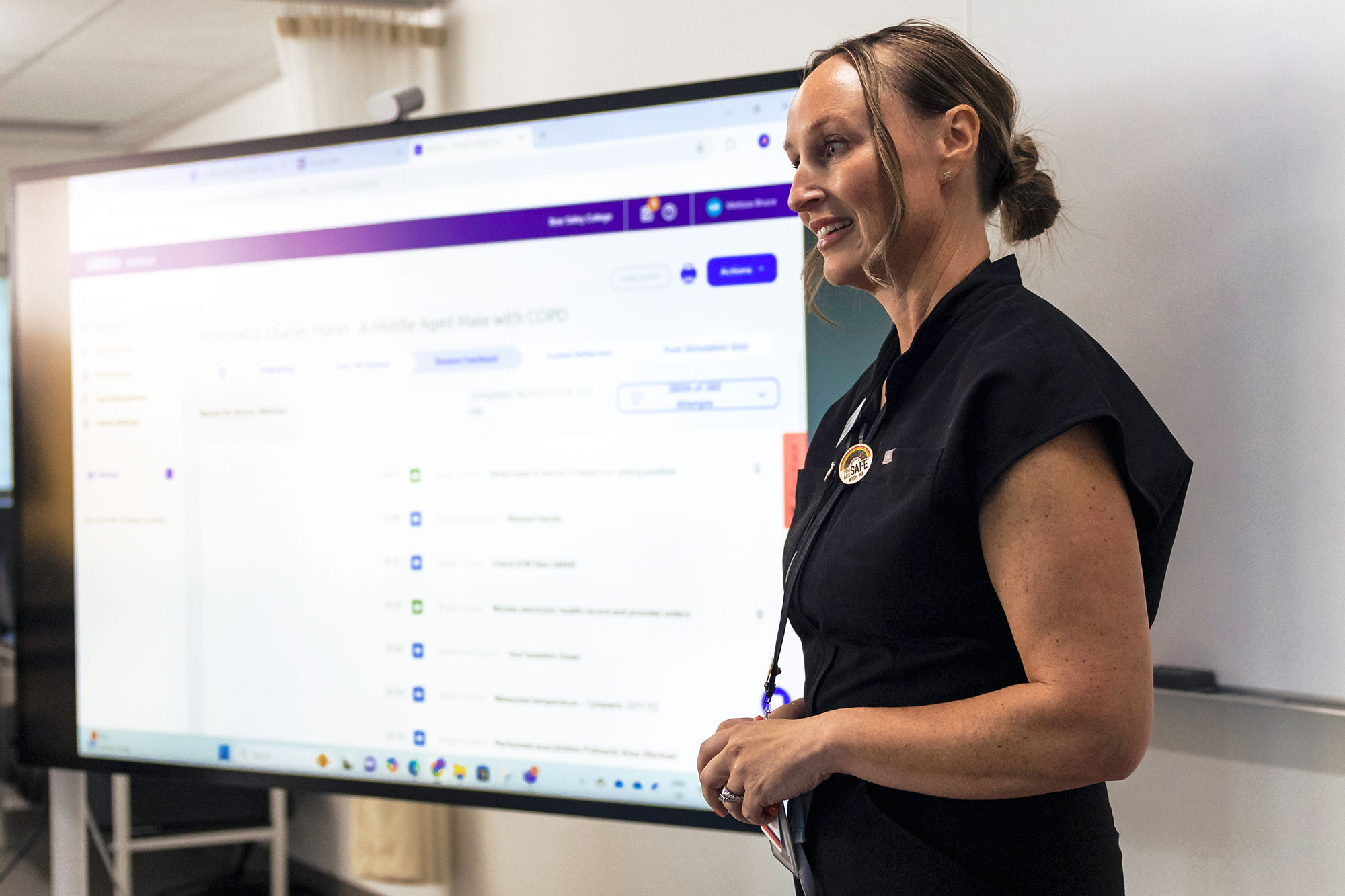Niagara College Research Finds UbiSim VR is Psychologically Safe & Enhances Clinical Reasoning
Table of Contents
Name of the heading
Niagara College wanted to test the efficacy of a nursing virtual reality tool before they committed to implementing VR across their whole nursing program. Dr. Holldrid Odreman, Ph.D., MScN-Ed, RN, CCNE, CCSNE, Professor of Nursing at Niagara College Canada and Stephen Shears, MN, RN, Nursing Practice Specialist, Public Health Niagara Region , investigated in their research study, “From Pre-briefing to Skills Performance: Approaches that Support Psychological Safety and Clinical Reasoning in Nursing Students” whether using immersive VR as a pre-briefing activity helped with psychological safety and clinical reasoning skills.
Dr. Odreman and Shears found, using UbiSim, that there was a positive correlation. VR was a confidence booster for nursing students to help improve their performance, make them feel safe, and increase clinical judgment.
Niagara College is now implementing UbiSim with its fourth-level graduating class of nursing students. If they determine it’s a sustainable solution, they plan to launch VR to hundreds of students across all four levels of nursing at their institution.
1- Start your table with the syntax {start-table}
2 - Add an H3 Heading to create a new column (this will be the column title)
3 - List cells as bullet points in a List element
4 - End your table with the syntax {end-table}
Key takeaways
- The study found a notable positive correlation between the use of UbiSim VR and improvements in psychological safety and clinical reasoning among nursing students.
- UbiSim extends the learning experience beyond VR, encouraging continuous reflection and critical thinking in students even after the session ends.
- Students found the VR experience intuitive and engaging, which was reflected in their positive feedback and the high scores they achieved in clinical reasoning assessments.
Key Findings of the UbiSim VR Study
Psychological safety and clinical reasoning
“There was a significant positive correlation between participants feeling psychologically safe and their ability to make clinical judgments during a simulated skills scenario. This suggests that as participants’ feelings of psychological safety during their pre-briefing experience increase, their abilities to carry out clinical reasoning and judgment tend to increase.”
Immersive VR helps students develop clinical judgment
“VR had the highest consistent rated scores out of the three pre-briefing techniques we tested. In addition, Vr contributed to the greatest scores on the Lasater Clinical Judgement Rubric for clinical reasoning.”
UbiSim helps students reflect on their experiences
“We found that not only are students reasoning in VR, but it's also leaving the students thinking after. We don't want the thinking to end just because the VR ended. We want students to continuously think about what happened, and that's the process of reflection that we definitely saw UbiSim helping with.”
User Experience with UbiSim
Ease of editing and customization
"The pre-made scenarios were already very helpful. I had to make minimal modifications, but the ones I made were intuitive and easy to complete. I was able to tweak the scenario to meet our program needs."
Positive student feedback
“The feedback of the students that used VR was very good. They certainly were the advocates for asking that we formally incorporate it into the program because it’s a very viable tool.”
Fostering student leadership with VR
“We’ll start with faculty facilitation as we begin to roll out the use of VR through UbiSim in our program. But I’m thinking about the idea of a VR student Champion group for peer-to-peer facilitation. The use of VR within the nursing program can help students enhance their leadership, collaboration, and communication skills.”
What makes UbiSim unique
“We knew UbiSim had a lot of specific involvement with the nursing world, which is really what we’re interested in. It’s also very intuitive to what a nurse would likely need to do at the moment in that environment. Another benefit is the level of realism; the immersion really helps students feel as if they are the nurse in that environment in that they're getting immediate feedback from the VR patient, not only visually but auditorily as well. So it's been really good.”
From Pre-briefing to Skills Performance: Approaches that Support Psychological Safety and Clinical Reasoning in Nursing Students Study
By Dr. Holldrid Odreman, Ph.D., MScN-Ed, RN, CCNE, CCSNE, Professor of Nursing at Niagara College Canada, and Stephen Shears, MN, RN, Nursing Practice Specialist, Public Health Niagara Region
Background and Research Question
A review of the simulation literature highlights the need to further understand the relationship between psychological safety and students’ clinical performance. This study aimed to determine to what extent there were differences in the experience of psychological safety and the performance of clinical judgement between three different pre-briefing techniques. This study also intended to determine how different pre-briefing techniques influenced students’ clinical judgement a simulated scenario.
Methods
Institution Research Ethics Board approval was obtained. A homogeneous group of nursing students (n=38) were randomly assigned to one of three distinct pre-briefing groups: Traditional, Concept Mapping, and Virtual Reality. Each pre-briefing session lasted 20 minutes. Participants completed a survey on Feeling Psychologically Safe following their pre-brief. After that, participants completed a 20 minute simulation scenario to assess their ability to carry out clinical reasoning and judgment using Lasater's clinical judgement rubric.
Results
Out of 50 participants, 38 participated for a response rate of 76 percent. Pearson correlation analysis showed a significant positive correlation between participants feeling psychologically safe and their ability to make clinical judgements during a simulated scenario. Therefore, as participants’ feelings of psychological safety during prebriefing increase, their abilities to carry out clinical reasoning and judgement tend to increase. A multivariate analysis of variance was conducted, suggesting the linear combination of scores from Feeling Psychologically Safe and Lasater’s Clinical Judgement was significantly different among the three prebriefing groups. An analysis of variance was conducted for each dependent variable to further examine the effects of Feeling Psychologically Safe during a prebriefing technique and the ability to carry out clinical reasoning and judgement during a simulated scenario.
Conclusions
Concept mapping and immersive virtual reality helped nursing students experience a higher level of psychological safety which had a positive impact on participants’ abilities to make clinical judgements during a simulated scenario. However, Virtual Reality had consistently high scores from the Feeling Psychological Safe survey and the Lasater Clinical Judgement rubric suggesting that virtual reality in prebriefing is an ideal technique to support the feeling of psychological safety and to improve clinical reasoning in nursing students.

“We want students to continuously think about what happened, and that’s the process of reflection that we definitely saw UbiSim helping with.”
Explore more

How UIW Systematically Made VR Simulation Psychologically Safe for Every Student
UIW scaled VR simulation to 28+ faculty and hundreds of students while ensuring psychological safety for every learner through systematic implementation.

How SELU Uses VR to Prepare Learners for Abnormalities They Can't Practice on Peers
SELU uses UbiSim VR to expose nursing students to abnormalities impossible to practice on peers—resulting in measurably better clinical performance.

How UFV Scaled a VR Simulation Program Across Six Years—and Counting
Discover how UFV scaled UbiSim VR in its BSN program over 6 years to fill clinical gaps, build student confidence, and support long-term skill growth.





